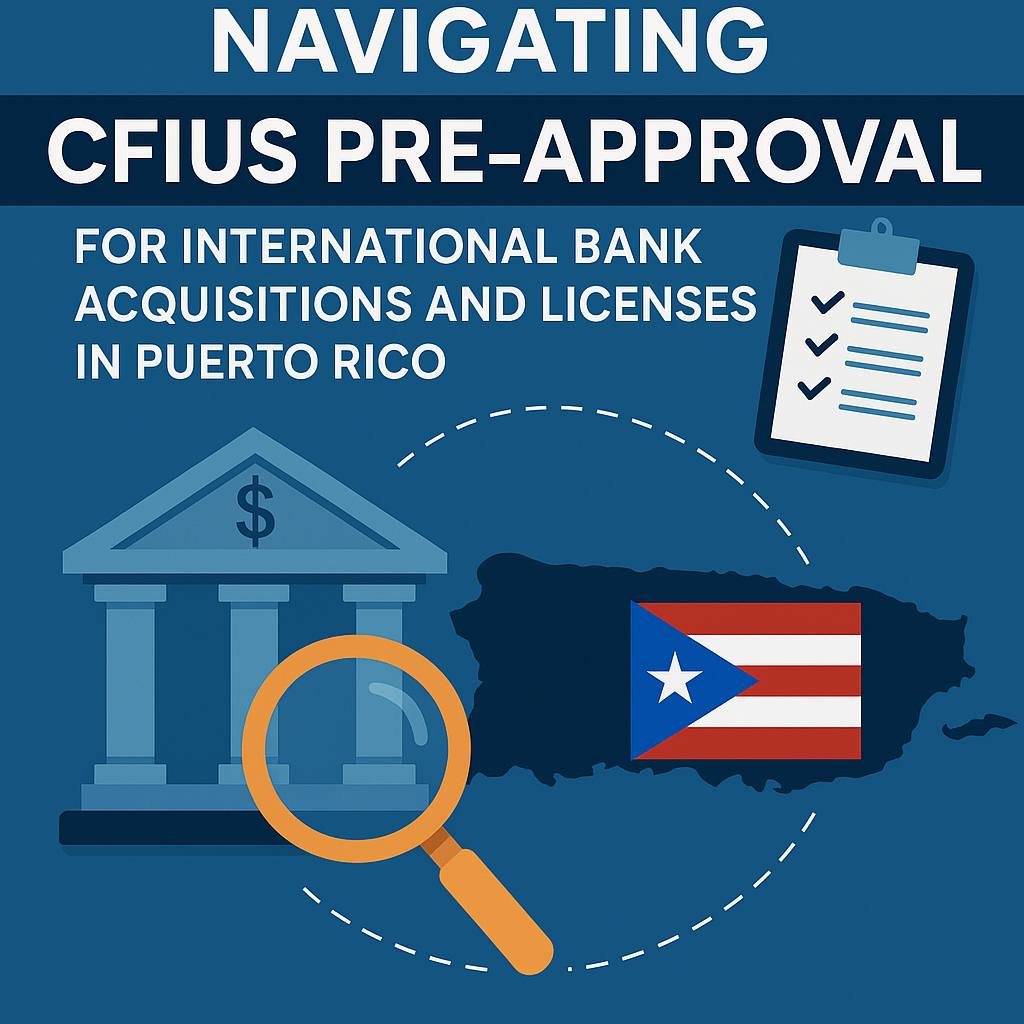In the complex landscape of international banking, Puerto Rico stands out as an attractive jurisdiction for foreign investors due to its status as a U.S. territory, offering a blend of U.S. legal protections and tax incentives under laws like Act 273 (International Financial Center Regulatory Act). However, acquiring an existing international bank—through a change of control—or applying for a new license as an International Financial Entity (IFE) or International Banking Entity (IBE) can intersect with U.S. national security reviews. This is where the Committee on Foreign Investment in the United States (CFIUS) comes into play. CFIUS, an interagency committee chaired by the U.S. Department of the Treasury, reviews foreign investments for potential national security risks.
While CFIUS filings are often voluntary for banking deals in Puerto Rico, seeking pre-approval through a voluntary filing can provide “safe harbor” protection, ensuring the transaction isn’t unwound post-closing. This article explores the CFIUS voluntary filing process, including timelines, steps, and expectations; when such a filing is advisable; key thresholds based on countries and ownership percentages; and strategies like using non-voting shares to minimize scrutiny. Note that Puerto Rico’s Office of the Commissioner of Financial Institutions (OCIF) handles primary licensing and change-of-control approvals, but CFIUS clearance can strengthen applications by addressing federal concerns upfront.
The CFIUS Voluntary Filing Process: Time, Process, and Expectations
CFIUS offers two main voluntary filing options: a short-form declaration or a full notice. These are submitted electronically via the CFIUS portal and can be initiated before formal OCIF filings for a Puerto Rico bank acquisition or new license.
Process Overview
- Pre-Filing Consultation: Parties are encouraged to engage in informal discussions with CFIUS staff, typically lasting 7-14 days or more. This involves submitting a draft declaration or notice for feedback, helping refine the submission and identify potential issues.
- Submission: For a declaration (abbreviated filing), provide basic transaction details. For a notice (detailed filing), include comprehensive information on parties, business operations, and national security implications.
- Review: CFIUS assesses for national security risks, such as access to sensitive data or critical infrastructure (relevant for banks handling financial information).
- Outcome: CFIUS may clear the deal, request a full notice (if starting with a declaration), impose mitigation measures (e.g., data security protocols), or recommend abandonment.
Timelines
- Declarations: Once accepted, CFIUS has 30 calendar days to respond. Including pre-filing, the process often takes 5-6 weeks.
- Notices: A 45-day review period, extendable by 45 days for investigation, plus potential 15-day extensions. With preparation, the full process can span 3-6 months or longer for complex cases.
- Overall: Factor in 1-2 months for OCIF alignment, as Puerto Rico applications require demonstrating compliance with U.S. laws.
Expectations
Expect questions from CFIUS within 2-3 business days of submission, requiring prompt responses. For banking deals, focus on data privacy, cybersecurity, and foreign influence. Clearance provides safe harbor, but unresolved risks could lead to deal modifications. In Puerto Rico, a positive CFIUS outcome can expedite OCIF’s review, which emphasizes financial soundness and integrity.
When a Voluntary CFIUS Filing is Advisable
Voluntary filings are recommended when a transaction could raise national security concerns, even if not mandatory (e.g., no critical technology involvement). For Puerto Rico international banks, this includes foreign acquisitions or licenses where investors might access U.S. financial systems or data. It’s advisable if:
- The deal involves “control” (broadly defined as influence over management) or non-controlling investments affording board seats, access to sensitive info, or veto rights.
- To mitigate post-closing risks, especially in banking where OCIF may defer to federal input.
- Foreign elements suggest scrutiny, as CFIUS can initiate reviews unilaterally.
Countries and Ownership Percentages Triggering Advisability
CFIUS scrutiny varies by investor nationality and stake. “Excepted foreign states” (low-risk allies) face lighter requirements, while others—especially from high-risk jurisdictions—warrant filings.
Excepted Foreign States (Minimal Scrutiny)
Investors from these countries are often exempt from expanded jurisdiction over non-controlling investments if they meet criteria (e.g., no ties to non-excepted states):
- Australia
- Canada
- New Zealand
- United Kingdom (including Northern Ireland, excluding territories)
Filings are less advisable for passive stakes under 10% from these nations.
High-Risk Countries (Advisable to File)
For investors from non-excepted states, especially those with geopolitical tensions or weak investment review regimes (e.g., African nations, China, Russia, Iran, etc.), filings are highly advisable. CFIUS may view even minority stakes suspiciously in banking.
Ownership Percentages
- Control Thresholds: No fixed percentage; “control” exists if a foreign person can direct management (e.g., >25% voting power or board influence). Advisable for stakes ≥10% if affording rights like board access.
- Non-Controlling: Advisable for investments ≥10% in sensitive sectors if involving non-passive rights. Below 10% and passive: Often not advisable.
- Aggregated: If multiple foreign investors total >25-50%, collective control may trigger advisability.
For Puerto Rico banks, file if foreign ownership exceeds these in high-risk setups to align with OCIF’s integrity checks.
Using Non-Voting Shares for High-Risk Shareholders
To reduce CFIUS exposure, structure investments so only controlling parties undergo strict due diligence. CFIUS focuses on “control” or specific investor rights; passive stakes are often exempt.
- Non-Voting Shares: Assign these to high-risk jurisdiction shareholders, limiting them to economic benefits without voting power, board seats, or access to sensitive data. This classifies the investment as “passive,” potentially avoiding CFIUS jurisdiction.
- Management Shares: Issue a class of voting shares to low-risk (e.g., U.S. or excepted state) entities or managers, concentrating control. This ensures only they face in-depth CFIUS/OCIF scrutiny, while high-risk investors hold non-voting equity.
- Benefits: Reduces overall risk, eases approval, and complies with OCIF’s focus on controlling persons for background checks. However, CFIUS may still probe if arrangements appear to evade review.
In summary, voluntary CFIUS pre-approval can safeguard Puerto Rico banking deals, particularly with foreign elements. Consult legal experts to tailor structures and filings, ensuring compliance with both CFIUS and OCIF.

